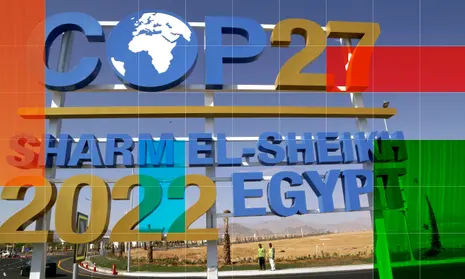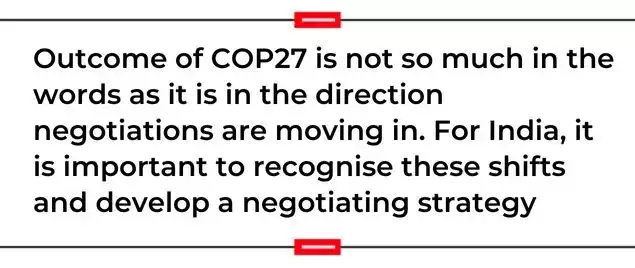This article originally appeared in Times of India
Two changes: accepting that biggest polluters will pay poor nations & pressure on China, India to contribute
The 27th Conference of Parties (COP27) to the UN Framework Convention on Climate Change (UNFCCC), which wrapped up in the early hours of Sunday at the Egyptian resort town of Sharm El-Sheikh, set things in motion that will have far-reaching implications for the international climate negotiations.

COP27 kicked off with the demand by the developing countries, especially least developed countries (LDCs) and small island nations, to set up a ‘Loss and Damage’ fund to compensate them for climate disasters. These countries, which have contributed the least to global warming, are now suffering annual losses in billions of dollars. For instance, the cost of the recent floods in Pakistan is estimated to be over $46 billion – 13.25% of the country’s GDP.
The loss and damage negotiation was acrimonious, to say the least, with the US entirely against any deal that would expose them to unlimited liability for their historic contribution to greenhouse gas (GHG) emissions. The negotiations also got into the question of who should pay, with small island states demanding that India and China should also contribute to the fund as they are now big GHG emitters.
Structure of compensation fund
Structure of compensation fund In the wee hours of Sunday, countries agreed to set up a new funding window to pay for loss and damage, but with many caveats attached to this fund.
- The fund will only support countries most vulnerable to climate change.
- It might not include India.
- Funding will come from both developed countries and a “mosaic” of sources, including the private sector and philanthropies.
Considering that wealthy countries have never met their financial commitment; one is sceptical of this fund’s ability to help developing countries.

Nevertheless, it is a big deal that the principle of compensating countries for climate disasters has been recognised. From now on, a certain “liability” will be put on big polluters and they will be under a moral, if not legal, obligation to support vulnerable countries.
Holdouts on oil and gas
It is tragic but a reality that it has taken 30 years for countries to realise that phasing down andultimately phasing out all fossil fuels is the most important factor to limit global warming. And it was India that set in motion the discussion to phase down all fossil fuels.
Last year at Glasgow, while countries agreed to phase down coal power to limit global warming, they kept silent on oil and gas due to pressure from big oil and gas-dependent economies, including the US and EU.
All the studies indicate that controlling global warming requires action on all fossil fuels, not just coal. This point was forcefully made by India and ultimately supported by nearly 80 countries, including the US and EU. But Russia and Saudi Arabia vehemently opposed the inclusion of oil and gas, and therefore it was not included in the final decision. Nevertheless, Sharm El-Sheikh has set in motion the need to phase out all fossil fuels, and it is a matter of time before this is accepted in a future COP.
Upending developed vs developing
The negotiations around loss and damage also unravelled the traditional classification of developed and developing countries, as outlined in the 1992 convention. The question of who should pay for loss and damage brought focus to China, the largest current emitter and second-largest historical emitter of GHGs.
China prefers to be called a developing country in the climate negotiations, which was questioned by many countries. The same applied to newly wealthy countries like Saudi Arabia, South Korea and Singapore.
Developed countries always wanted to upend the classification. At COP27, they got the support of many small island states and LDCs to do so. While the final text has not clearly mentioned the larger role of emerging economies, it is pretty clear that from now on, countries like China will find it challenging to avoid greater responsibility for the climate crisis. There will also be pressure on India to contribute more, as it is traditionally bracketed with China at the UNFCCC.
Implementation through a just transition
Just transition, the socio-economic impact of phasing down fossil fuels, has emerged as an important agenda at COP27. Mid-way through the COP, a $20 billion deal was struck between Indonesia and G7 countries at the G20 meeting in Bali to phase down coal use in Indonesia in a just manner.
Called Just Energy Transition Partnership (JET-P), a similar deal worth $8.5 billion was signed between South Africa and G7 last year. A JET-P deal was offered to India, which it rightly postponed for future negotiations.
Overall, the outcome of COP27 is not so much in words as it is in the direction the international negotiations are moving in. For India, it is important to recognise these decisive shifts and develop a negotiating strategy that is good for the country and the planet. India did quite well at Sharm El-Sheikh by proposing the phasing down of all fossils, supporting developing countries on loss and damage, and releasing its Long-Term Low Emission Development Strategy. Now is the time for the country to relook at its negotiating position that will advance the development and climate agenda together.
Chandra Bhushan is one of India’s foremost public policy experts and the founder-CEO of International Forum for Environment, Sustainability & Technology (iFOREST).
